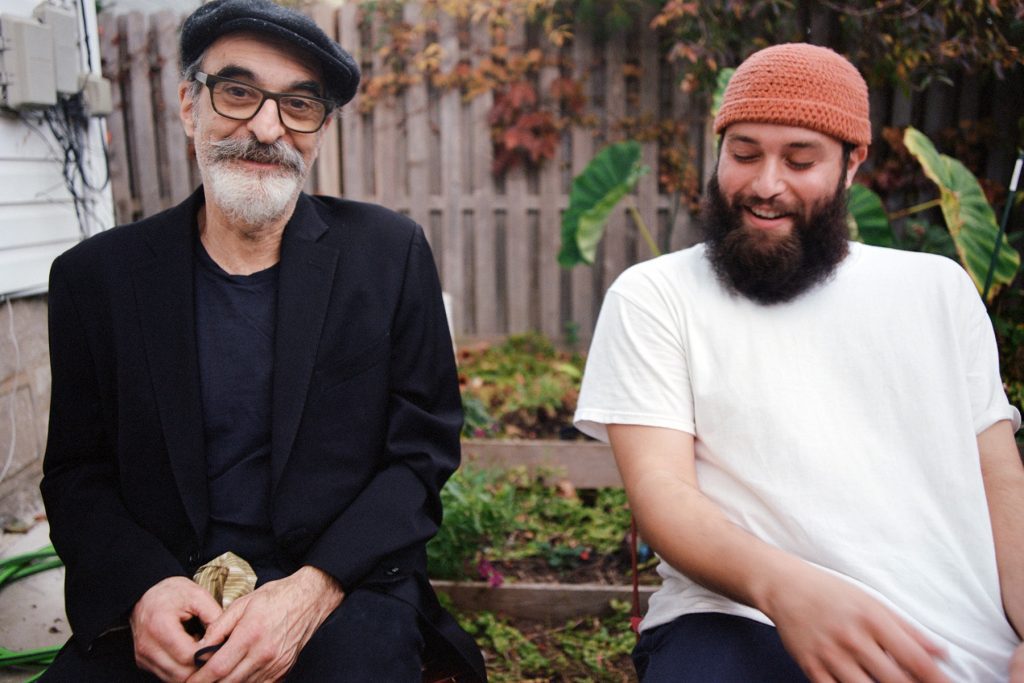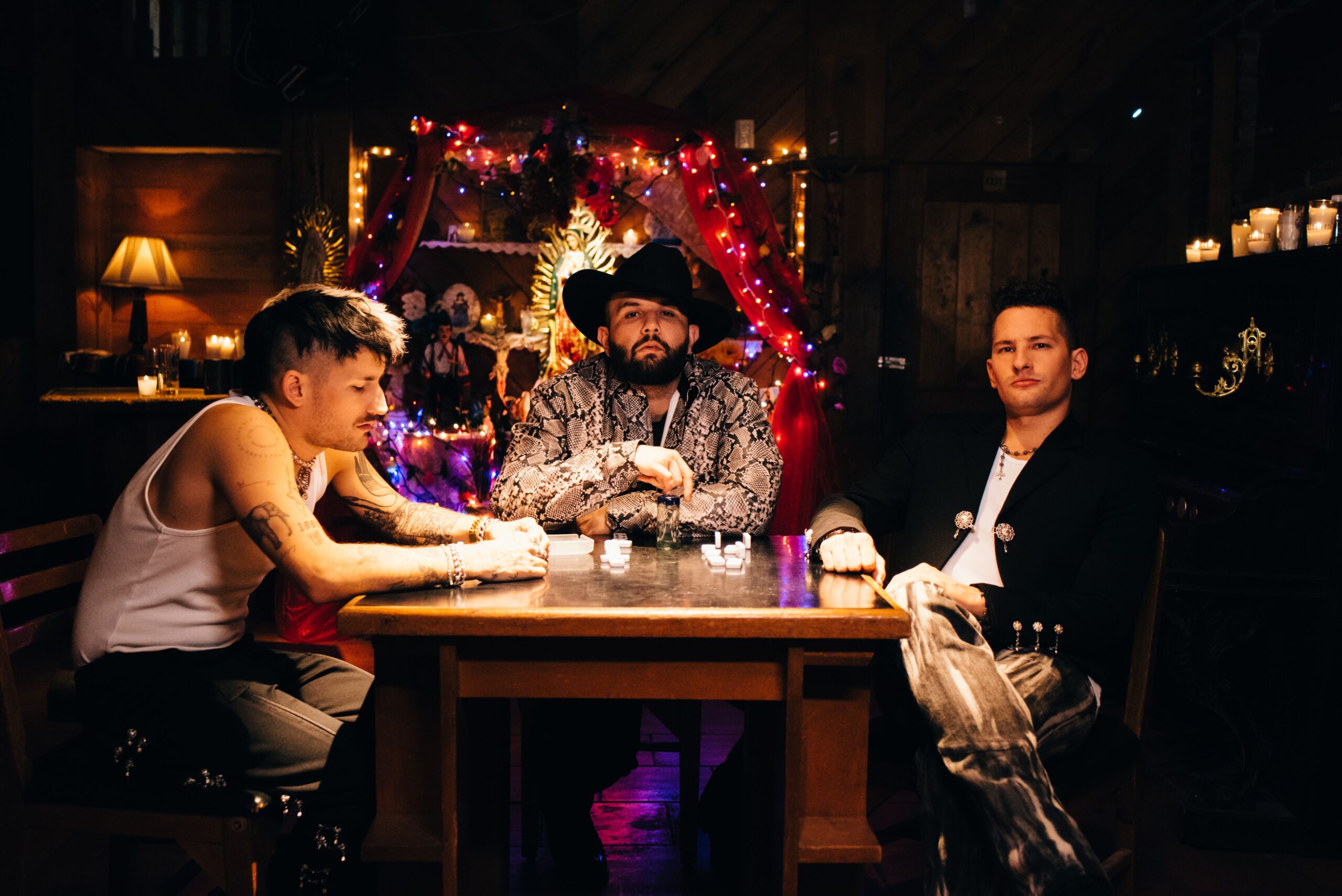
Nick Hakim, Roy Nathanson, and Creating Community During Covid
If you listen closely, you can hear the subtle sounds of sirens in the background of “Small Things 2,” the final track on Nick Hakim and Roy Nathanson’s collaborative album, Small Things. Much of the album was recorded before Covid shut down the music industry, but Hakim and Nathanson weren’t happy with a few of the takes, so they had to settle for collaborating over a distance, even though they lived a few miles apart in Brooklyn.
“I recorded the final vocals for that song on my birthday, at the beginning of June, when things were really bad here. Every five minutes, another ambulance or fire truck would go by,” Hakim says over the phone from Nathanson’s house in Flatbush, where the duo have been toasting the album’s release. Knowing that Hakim’s dreamy voice was floating over a Brooklyn stupefied by a relentless virus gives the entire album a sepulchral quality, as if the anxieties and fear the city felt were etched into the record.
But Small Things started before all that. Hakim, 30, has been one of the defining voices in a warm, atmospheric strain of funk and R&B in recent years, and has worked with everyone from D’Angelo and Erykah Badu (as part of the mysterious Slingbaum project) to Gabriel Garzón-Montano and English indie artist Nilüfer Yanya. Nathanson, 69, has been a staple of the downtown jazz scene for decades, leading groups like the Jazz Passengers and Lounge Lizards; he also has a deep pedigree as a composer, and has worked with Elvis Costello and Debbie Harry.
blogherads.adq.push(function () {
blogherads
.defineSlot( ‘medrec’, ‘gpt-dsk-tab-article-inbody1-uid0’ )
.setTargeting( ‘pos’, [“mid-article”,”mid”,”in-article1″,”mid-article1″] )
.setSubAdUnitPath(“music//article//inbody1”)
.addSize([[300,250],[620,350],[2,2],[3,3],[2,4],[4,2]])
;
});
The two musicians met while playing a gig with the polyglot downtown jazz group Onyx Collective at the New York Winter Jazzfest in 2018. Both had been in the Onyx Collective orbit for years: Hakim as an associate and frequent collaborator; Nathanson as the mentor and former teacher of the group’s co-founder, Isaiah Barr. When Hakim read through some of Nathanson’s poetry and asked if he could put the words to song, the jazz veteran agreed immediately.
“When Nick sang those words, he had this instinctive understanding of the emotion behind them,” says Nathanson. “He communicated the loneliness, the longing, and then made magic with the music. It was incredibly natural.” Even though the duo have only known each other a handful of years, their seamless collaboration was the result of years of collaborative ferment within Onyx Collective’s scene. Being associated with the jazz group is like a secret handshake for artists and fellow travelers: If you know, you know.
Piecing Small Things together remotely was a more challenging process, especially since so much of the music had emerged from in-person collaborations. Not being able to sit together during the mixing process and express elation and disappointment in real time, or observe each other’s reactions without worrying about bandwidth, sapped some of the synaptic spark from the process. “When you’re sitting there, not being able to read each other’s faces and listening to the final mix together, it takes some of that energy away,” says Nathanson.
But even as stem files were forced to zoom back and forth from Bushwick to Flatbush, Nathanson and Hakim knew they were building something special together. Small Things flits between musical eras, leaning on both Nathanson’s storied career in jazz and Hakim’s role in modern funk and R&B. Both artists have tendencies towards the abstract, which means there are difficult, abstract passages throughout the record — but they’re deployed delicately and deliberately, there to build tension before yielding to dreamy pleasures.
“Moonman,” the album’s lead single, sounds like the duo floating through space, riding gravitational waves while Nathanson spikes Hakim’s lunar crooning with twinkling notes from his sax. There are stylistic pushes and pulls as well: “Cry and Party” is built on the sort of jazz-pop pastiche that Nathanson perfected while part of the Lounge Lizards and Sotto Voce, while “Things to Not Like and Like in America” shares patterns with the lead-heavy atmosphere Hakim created on his 2020 record Will This Make Me Good.
blogherads.adq.push(function () {
blogherads
.defineSlot( ‘medrec’, ‘gpt-dsk-tab-article-inbody2-uid1’ )
.setTargeting( ‘pos’, [“mid-article2″,”mid”,”in-article2″,”mid-article”] )
.setSubAdUnitPath(“music//article//inbody2”)
.addSize([[300,250],[300,251],[620,350],[2,4],[4,2],[3,3]])
;
});
Still, Nathanson’s poetry has a grounding effect on the entire album. Hakim’s ethereal voice turns some of the compositions into otherworldly lullabies, while Nathanson’s spoken-word versions are downright thespian, a downtown Ovid passing on lessons to the next generation. “Today you’re the guy to look at on the subway/You’re the guy falling asleep all bent-over/Bad news caught in your throat like a cold,” Hakim croons on the opening of “New Guy to Look At,” with Nathanson’s weaponized second-person transformed into a self-conscious serenade.
Nathanson’s role as mentor and literal teacher to the Onyx Collective crew made Small Things all the more special to Barr, as well. “It was surreal, but also felt like the culmination of something for us,” he says on the phone from Nathanson’s house. Small Things is the first release on Onyx Collective’s NYXO Records label, which will soon be home to more music from the group and their friends. This record is head-to-toe Onyx as well: Co-founder Austin Williamson plays drums on every track, while longtime collaborator Spencer Murphy plays bass on the majority of the album. Even the video for “Moonman” was directed by Onyx day-one Mike Swoop; Hakim and Nathanson’s spacesuits from the video were created by Maxwell Deter, the group’s visual director.
While much of Small Things was an Onyx Collective family affair, the pandemic had an isolating effect on the final stretch. “It was tough, but we just had to figure out a way forward,” Hakim says. That included video calls to discuss final mixes and sending takes back and forth to see which ones worked best. Nathanson is still shocked that he won’t be playing a show the evening of a release. “Not playing a gig the day a record comes out? It’s crazy to me,” he says.
Still, Barr says that the pandemic has ultimately served to reinforce the bonds of the community around him. “All this — it let us strip away distractions and refocus and get closer,” he says. Barr has been practicing with and learning from other artists remotely, and he says the interactions are liberatingly stripped of any pretense or expectations. They can just create music together.
blogherads.adq.push(function () {
blogherads
.defineSlot( ‘medrec’, ‘gpt-dsk-tab-inbodyX-uid2’ )
.setTargeting( ‘pos’, [“mid”,”mid-articleX”,”in-articleX”,”mid-article”] )
.setSubAdUnitPath(“music//article//inbodyX”)
.addSize([[300,250],[300,251],[3,3],[620,350]])
.setLazyLoadMultiplier(2)
;
});
Hakim and Nathanson are both hopeful for what a post-pandemic New York City scene could look like, for different reasons. Nathanson lived through the AIDS crisis that ruptured his arts community in the 1980s, and knows that resilience in the face of trauma can seed great art. “I think this is going to force the music community to find new ways of doing things, new ways of communication, new ways of collaborating,” he says.
Hakim hopes that a “resurgent” grassroots music community will grow in the shadow of Covid, with artists able to play gigs outside of the usual rotation of venues in Brooklyn and Manhattan. “I’m looking forward to more shows in people’s apartments and more shows in people’s basements,” he says. “People are going to find smaller ways of playing together.”
Small Things feels like that humbler scene sprouting green shoots, a preview of those “smaller ways” Hakim talks about. What that community looks like when the wail of 2020 sirens finally ebbs into a distant memory is up to artists like Hakim and Nathanson, and the early signs are promising.




